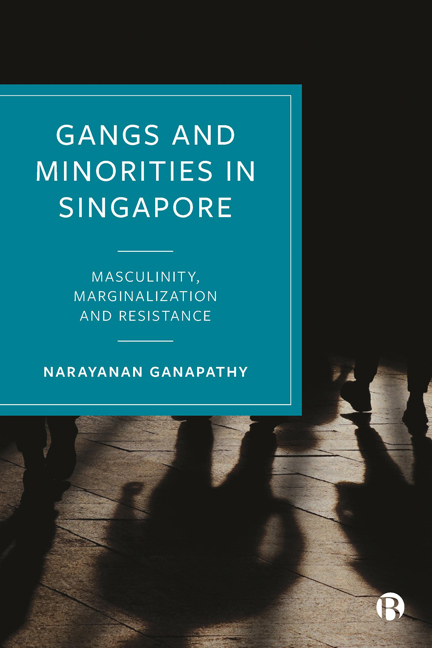Book contents
- Frontmatter
- Contents
- List of Figures
- List of Abbreviations
- Glossary of Non-English Terms
- About the Author
- Preface
- 1 Introduction: Framing the Study
- 2 Omega as Organized Crime?
- 3 Racial Minorities and Crime
- 4 Methods of Study
- 5 The Rise of Omega
- 6 Fearless and Fearsome
- 7 The Omega Wave: The ‘Triadization’ of Omega
- 8 Conclusion: Law, Drug Crimes and Marginality
- Notes
- References
- Index
8 - Conclusion: Law, Drug Crimes and Marginality
Published online by Cambridge University Press: 28 March 2024
- Frontmatter
- Contents
- List of Figures
- List of Abbreviations
- Glossary of Non-English Terms
- About the Author
- Preface
- 1 Introduction: Framing the Study
- 2 Omega as Organized Crime?
- 3 Racial Minorities and Crime
- 4 Methods of Study
- 5 The Rise of Omega
- 6 Fearless and Fearsome
- 7 The Omega Wave: The ‘Triadization’ of Omega
- 8 Conclusion: Law, Drug Crimes and Marginality
- Notes
- References
- Index
Summary
This book is the outcome of an in-depth study of Omega, a Malay Muslim prison gang which, over a span of less than three decades, transformed itself from a prison protection group into an organized criminal enterprise with transnational links. It has retained its notoriety among the secret societies of Singapore, albeit a racially exclusive one, having established its dominance in the drug trade locally and regionally since the 1990s. In part, this book documents the genesis of the gang and its use of Islamic doctrines and strong ethnoreligious overtones in creating a Muslim brotherhood within the context of racialized social structures of the prison and criminal underworld of free society. It also tells the story of a group of Malay men and youths, and their response to the hangover of colonial racialization and structural marginalization, as well as their attempts to achieve social mobility in the legitimate and illegitimate worlds by means of organizing themselves into gangs. While many working-class Malays experience disempowerment in conventional society on the basis of social class, those who have crossed over to the illegitimate sector also find themselves being structurally marginalized in that space on the basis of race. Reflecting global trends concerning many racial minority and Indigenous peoples, Malays are disproportionately represented in the criminal justice system, particularly where drug abuse is concerned, and are often caught in the vicious cycle of arrest–incarceration–re-arrest (Ganapathy and Lian, 2016).
Theoretical contributions
In considering explanations for racial disparities in the criminal justice system, I have taken a functionalist-structuralist perspective, not that the contrary view – the racial bias thesis – is less efficacious or irrelevant in the Singapore context. The reason for my choice derives from the fact that there is no publicly available data or empirically based research to support such a premise that would incontrovertibly show evidence of such racial bias and discrimination. By assuming a functionalist-structuralist stance, I assume the position that racial disparity in crime is likely to be the result of the structural marginalization of a segment of a racial minority in postcolonial Singapore society.
- Type
- Chapter
- Information
- Gangs and Minorities in SingaporeMasculinity, Marginalization and Resistance, pp. 159 - 172Publisher: Bristol University PressPrint publication year: 2023



